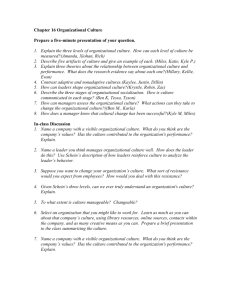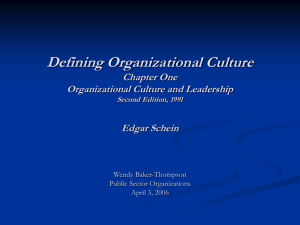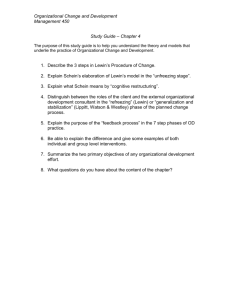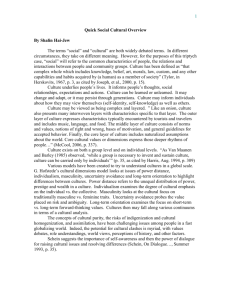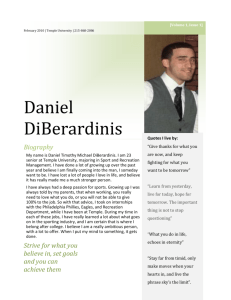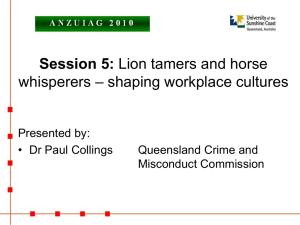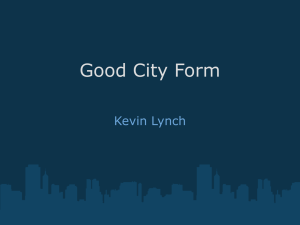The Map is Not the Territory
advertisement
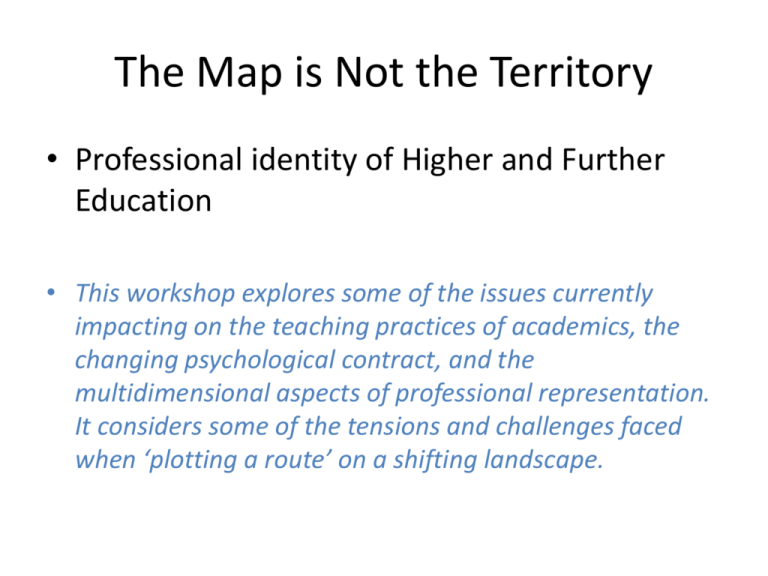
The Map is Not the Territory • Professional identity of Higher and Further Education • This workshop explores some of the issues currently impacting on the teaching practices of academics, the changing psychological contract, and the multidimensional aspects of professional representation. It considers some of the tensions and challenges faced when ‘plotting a route’ on a shifting landscape. Plotting a route on a shifting landscape. • Henkel (2000) asserts that in order to effectively consider the concept of professional identity it is vital to consider that each individual has a distinct history, with a unique moral and conceptual framework, and it is shaped and defined within a specific community by the prescribed value that he or she is given. It is the interplay of these elements that determine professional identity and shape its effectiveness. Temple Clothier, A. (2013) Autoethnography • • • • • • • • • • • • Senior Fellow of the Higher Education Academy (SFHEA) Chartered Fellowship, Chartered Institute of Personnel & Development (FCIPD) Licenced Hypnotic Practitioner Master Practitioner in Neuro Lingustic Programming Post Graduate Certificate in Higher Education Advanced Professional Diploma in Mentoring Master of Science - Human Resource Management Assessor Award with Verification Units TDLB D32, D33, D34 Post Graduate Certificate in Education Post Graduate Diploma in Personnel Management Post Graduate Diploma in Management Ba (Hons) Organisational Studies • • • • • • • • • • • • • • • • 1999 Date Leeds Met 2005 – Date Senior Lecturer. Teacher Fellow Education, Carnegie 2003 – 2005 PT Lecturer Leeds Business School 2002 – 2003 PT Lecturer Centre for Access and Life Long Learning 1999 - 2002 European Researcher for Vocational Education and Training. Carnegie 1997 – 2005 Harrogate College 2000 -2005 Corporate Staff Development Coordinator 1997 – 2000 Course tutor and Lecturer HRM . Business school 1997 - 1999 Bradford and Ilkley Community College 1997 – 1999 PT Lecturer, HRM, Business studies 1993 – 1997 Airedale and Wharfedale College (Park Lane) 1996 – 1997 Staff Development Officer 1993 – 1997 Course Tutor. Lecturer. But what do you do when your ‘history’ provides insufficient guidelines for ensuring future success? • Nixon (1996) proposes that changes in the Higher Education Sector have resulted in a fragmentation of the academic workplace and increased the differentials between individuals in terms of status and autonomy and has had a profound effect on the participation of academics and their sense of professional identity. This shift in professional identity has been the focus of writers such as Henkel (2000), Trowler and Knight (2000), Rhoades (2007) and others..... What emerges from the literature is a consensus that changes to the structure and ideologies associated with the communities within which academics are located has resulted in a profound effect on both the practices and professional identity of those working within them. Temple Clothier, A. (2013) Mapping ‘What counts’ for the employer • Universities are social systems, and as a result can be viewed as ‘power systems’ locked into ‘institutional mediation of power’ (Giddens 1985. p.9) Organizational theorists and economic sociologists, note the significant role the informal structures have in terms of shaping both internal communication within the organisation (Crozier, 1964; Roethlisberger & Dickson, 1939; Trist & Bamforth, 1951) Possible maps: or a conceptual analysis of ‘What counts?’ Corporate indicators • Mission Statement • Contract of employment • Job description • Professional body standards ‘Ours is an organizational society’ (Scott 1981, p. 3) Personal values • Value associated with the sector • Values associated with the organisation • Values associated with the faculty / department • Values associated with primary discipline • Primary values It’s only a flesh wound ! Ackerman and Maslin-Ostrowski acknowledge that professionals face conflicting and challenging forces and demands and need to satisfy a range of stakeholders in ever changing circumstances. They use the concept of ‘wounding’ to identify something that is emotionally experienced at a deep and personal level “where a leader’s decisions, motives and integrity are impugned by others” (Ackerman and MaslinOstrowski 2002 p Xii). Whilst they recognise that this ‘wounding’ may have nothing to do with the level of competence demonstrated, they suggest that to the person experiencing it, it feels like an attack on the heart and produces the characteristics of “loss of control, powerlessness, fear and vulnerability” (Ackerman and Maslin-Ostrowski 2002 p Xii). Temple Clothier, A. (2013) Internal career, external career. In 1996 Schein noted that, on a global basis, organizations are undergoing a metamorphosis. He suggest that whether it is thought of as "downsizing," "rightsizing," "flattening," becoming a "learning organization," or simply as "transformations" the changes are profound (Schein 1996, online). Throughout much of his work he develops the concept of the “internal career” which he defines as the “subjective sense of where one is going in one's work life, as contrasted with the "external career," the formal stages and roles that are defined by organizational policies and societal concepts of what an individual can expect in the occupational structure” (Schein, 1978, 1990). He concludes “Self-reliance and selfmanagement are becoming dominant requirements for future career management” (Schein 1996, online). Temple Clothier, A. (2013) Off-the-grid In addition to shaping communication, the informal processes also shape how work is conducted, and how tasks area achieved, in effect they determine “practice” (Barnard, 1938; Crozier, 1964; Roethlisberger & Dickson, 1939; Trist & Bamforth, 1951). The power of the gatekeeper is identified in the work of Holloway and Wheeler (2002) who describe the gatekeeping role as one that either allows or denies another person access to either someone or something. A consensus emerging from the literature covered is that the gatekeeper is in fact a powerful role. Bounds (2012) emphasises the need for researchers to be aware of the gatekeepers power, and draws on Campbell (2012) to suggest that ‘This power over participants is not a physical power as much as it is a result of the role of the gatekeeper (Campbell, Ethics and Qualitative Research Video 41, 2012 – cited in Bounds 2012 p 7). The gatekeepers ability to effect a learner’s / researchers capacity to ‘self author’ is evident. Temple Clothier, A. (2013) It is suggested that many of the new students do not have the ease with abstract conceptualisation and theoretical ideas that their predecessors had (Coaldrake 1998) In addition they often come equipped with greater technical literacy and ease with communication packages that outstrip the ability of academic lecturers (Scott 1995: 5) cited in Temple Clother, A (2013). Most followed on twitter • • • • • • No 1 No 4 No 36 No 59 No 87 No 88 Justin Bieber 40,122,824 Barack Obama 32,435,110 Bill Gates 11,607,054 CNN 8,968,963 Simon Cowell 7,159,149 Dalai Lama 7,114,138 http://friendorfollow.com/twitter/m ost-followers/ Baraniuk, C. (2013) The Promise of Technology. When the map is not the territory ……… Magolda and King (2008) present a model of ‘self authorship’ advocating that those in academic institutions engage in learning partnerships that validate the researcher’s ability to construct knowledge. Sparkes, A. (2007) Embodiment, academics, and the audit culture: a story seeking consideration Qualitative Research 2007; 7; 521 Sage Publications Reference List • • • • • • • • • • • • • • Ackerman, R. & Maslin-Ostrowski, P. (2002) The Wounded Leader San Francisco Jossey-Bass Baraniuk, C. (2013) The Promise of Technology. The Machine Starts: How Technology is Changing Humanity Bit by Bit. http://www.themachinestarts.com Barnard, C. (1938). The Functions of the Executive. Cambridge: Harvard University Press. Bound, M. (2012) Ethics in Qualitative Research; Gatekeepers. Ethical Considerations with Gatekeepers Nova Southeastern DCAR 7120NSU PhD. Program Campbell, J. (2012, January 13). Introduction to Ethics in Qualitative Research. 41 (Section 1.5). FortLauderdale, Florida, USA: Nova Southeastern University. Coaldrake, P. (1998) Comments on Roderick West’s discussion paper ‘Learning for Life’. Higher Education Research and Development, 17 Crozier, M. (1964). The bureaucratic phenomenon. Chicago: University of Chicago Press. Friend or Follow (2013) http://friendorfollow.com/twitter/most-followers/ Giddens, A. (1985) The Nation State and Violence: Volume Two of A Contemporary Critique of Historical Materialism. Cambridge: Polity. Henkel, M. (2000) Academic Identities. Policy Change in Higher Education, London and Philadelphia: Jessica Kingsley Publishers. Holloway, I and Wheeler, S. (2002) Qualitative Research in Nursing Oxford: Blackwell Magolda M and King P (2008) Toward Reflective Conversations: An Advising Approach that Promotes SelfAuthorship AACU Peer Review Winter 2008, Vol. 10. No 1. Association of American Collages and Universities Nixon, J. (1996), �Professional identity and the restructuring of higher education�, Studies in Higher Education, Vol. 21, No. 1, pp. 5-16. Perry, William G., Jr. (1970). Forms of Intellectual and Ethical Development in the College Years: A Scheme. New York: Holt, Rinehart, and Winston. • • • • • • • • • • • • Rhoades, G. (2007). The study of the academic profession. In P. J. Gumport (Ed.), Sociology of higher education. Contributions and their contexts (pp. 113–146). Baltimore: The Johns Hopkins University Press. Roethlisberger, F. J., & Dickson, W. J. (1939). Management and the worker. Cambridge: Harvard University Press. Scott, P. (1995) The Meanings of Mass Higher Education. Buckingham: SRHE and Open University Press. Schein, E. H. (1978) Career Dynamics: Matching Individual and Organizational Needs. Reading, MA.: Addison-Wesley. Schein, E. (1980) Organisational Psychology. Englewood Cliffs, NJ:Prentice-Hall. Schein, E. H. (1990) Career Anchors, Trainers Manual. San Diego: Pfeiffer, Inc. Schein, E.H. (1996) Career Anchors Revisited, Implications for Career Development in The 21st Century. Society for Organisational Learning (Online) Available: http:// www. http://www.solonline.org/res/wp/10009.html#ref Sparkes, A. (2007) Embodiment, academics, and the audit culture: a story seeking consideration Qualitative Research 2007; 7; 521 Sage Publications Temple Clothier, A. (2013) Metaphorical Metamorphosis: A reflection on one years personal and professional development. Researching education in the 21st century: new directions, innovations and challenges. Leeds Metropolitan University. Leeds March 2013 Trist, E., & Bamforth, W. (1951). Some social and psychological consequences of the longwall method of coal-getting. Human Relations, 4, 3-38. Trowler, P., & Knight, P. T. (2000). Coming to know in higher education: theorising faculty entry into New Work contexts. Higher Education Research and Development, 19(1), 27–42.
